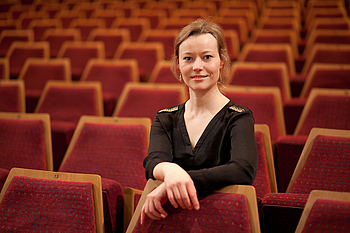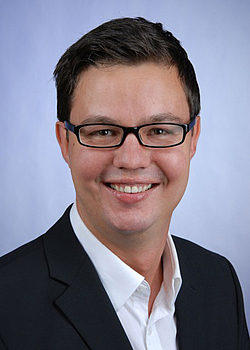“Music is our common language”: Deqin Li, Trumpet
“How time flies! It’s been almost two years since I graduated from the University of Music FRANZ LISZT Weimar and started working as a professor at the Shanghai Conservatory of Music (2018). During this period, I’ve been a solo trumpeter at the China Philharmonic Orchestra, a guest solo trumpeter at the Shanghai Symphony Orchestra and a Yamaha Instrument Artist.
This busy, fulfilled life makes me very emotional. It’s a true joy when we can meet the right people, and make the right decisions at the right point in time. Studying at UoM Weimar was the best decision I’ve made in my life. Here, I met the skilled professor Uwe Komischke, who helped me elevate my future to a new level. Germany is the birthplace of music, and it was always my goal to come here to study the trumpet.
Professor Uwe Komischke places great importance on basic training. A professional musician must be a master of stage performance. To strengthen my playing, I practised an array of basic skills under the professor’s supervision, and increased the number of exercises every day. In addition, Professor Komischke also helps his students to gain practical experience in various orchestras. In class, he explained the background behind various symphonies and told me about the interesting lives led by many masters, so that I could understand the pieces more quickly and play them better. Even more importantly, my professor encouraged me to start running, so I could increase my stamina. Good health is very important for a musician who works a lot, especially as a solo trumpeter in an orchestra, who plays a lot of solos. It is very rare to find a teacher like this, who educates his students in a holistic way.
Previously, turbulent performances made it impossible for me to calm myself down and reflect, and I did not have a lot of time to really feel life, either. But in the strong musical atmosphere of the University of Music FRANZ LISZT Weimar, I was once again a student, and could enjoy music: practising, listening to concerts, feeling the atmosphere of music. The university offers the best environment for learning, so you can really concentrate on your studies. Studying under Professor Komischke had such an impact on me that I am still able to pass this careful manner of teaching on to my students today.
Recently, I returned to the UoM with my students, and we had a very successful exchange with Professor Komischke’s trumpet class. It was an indescribable feeling, seeing them standing in the church, playing sacred music together. Music is our common language: no differences, no boundaries. Thank you to the university, and to my professor. I hope every musician at the University of Music in Weimar will have a good life.”
Deqin Li, Shanghai
Professor Deqin Li is now a Professor of Trumpet at the Shanghai Conservatory of Music.
“Relationships from Weimar that I’ll never forget”: Keitaro Shimizu, Trumpet
“It was definitely one of the best decisions I ever made, when I chose to study at UoM Weimar in 2013. I first met Professor Komischke, in Japan, when he gave a masterclass at my university. Since then, he has been my mentor, by my side both musically and intellectually, and I can still not find the words to express how thankful I am to him for this.
It took a long time for me to put aside negative thoughts that were holding me back somewhat. In our lessons, we played a good deal of music, but we also spent a lot of time talking. I will never forget the sentence he said to me during almost every class: ‘You’re actually good, and above all, you have a lot of potential – but for the next big step on a technical level, and for your stage presence, you need a hefty dose of optimism and self-confidence, so that you can really be successful.’ This was one of the biggest challenges I had to overcome. As far as my goal was concerned, Weimar was simply the best city you could imagine. There are lots of reasons for this, and I would like to list just a few of them now: when I was studying in Weimar, I was lucky enough to take part in lots of great orchestral projects run by the university, including ‘Mass in B Minor by Johann Sebastian Bach’, ‘Stravinsky’s Petrushka’, and many others. I was always blown away by how high the level was for each group of instruments. And that’s not all: with our trumpet class, too, we were always able to play well together in a practical sense, in our own concerts. Thuringia is home to lots of very good regional orchestras, and every time I was allowed to collaborate with an orchestra, I was able to prove that the things I had learned and felt at the university worked on a professional level too.
In Thuringia, there is a strong, soulful yearning for good classical music, and you can feel this in your very bones at every event, big or small. I might see that somewhat subjectively, but my own experiences enabled me to feel it. People here applaud passionately after a concert, more so than in other places, and you receive a heartfelt thanks from the audience. That led me away from my excessive self-criticism every time. As a result, I became aware of why I play the trumpet. I never found the answer to that question in Japan. I am very grateful to Weimar for all these musical opportunities that I have experienced.
Although I now live in Stockholm, I will never forget my experiences and relationships from Weimar, and I count this time as one of the most intense, beautiful periods in my life. Each time I come back, I am delighted to visit the city and see my former colleagues once again.”
Keitaro Shimizu, Stockholm
Keitaro Shimizu is a trumpeter who lives in Stockholm. There, he has been solo trumpeter at the Royal Swedish Opera (Kungliga Operan) for one year.
“A fantastic, highly motivational environment in which to study”: Hanna Guirten, Horn
“Before I came to Weimar to study in October 2016, I had spent five years living and studying in Amsterdam. I was excited to move from a ‘big’ city where I felt very much at home and had lots of friends, to a city that, in my view, was the opposite of Amsterdam. At least I was able to speak the language fairly well because my father comes from Germany.
Over the first three months, I really had to get used to life in Weimar. I knew that the horn class in Weimar was big, and operated at a high level. My teacher, Professor Jörg Brückner, had a highly motivated class, and that was nerve-racking initially, but above all, it was enormously motivational. The team spirit and atmosphere among the students were good.
Studying in Weimar was very important for me. There, I had far fewer distractions than in Amsterdam, which meant that I could enjoy a fantastic, highly motivational environment within which to study. The facilities in Weimar are outstanding. There was almost always a practice room free in the Hochschulzentrum am Horn, and Professor Brückner did not just give me lessons: he also gave me self-confidence. Then there were the frequent auditions, which were just perfect for me. And I have fond memories of whiling away the small hours in the ‘Stubenfliege’...
The world of classical music is richer in Germany than it is in the Netherlands. There are many more orchestras here than we have, and that means there are many more opportunities at auditions. After around three months in Germany, I started playing at auditions. During the 2017-2018 season, I played both high and low horn at the Staatskapelle Weimar and I played in an opera for the first time in my life. I also became familiar with life in a German professional orchestra.
After lots of auditions in Germany, I had an audition in the Netherlands in 2018, and won! It is a very special experience that, after so many auditions in Germany, I ultimately won an audition in my home country. And I would never have managed it had I not studied in Weimar.”
Hanna Guirten, Groningen
Hanna Guirten won a ‘trial’ as solo horn at the London Symphony Orchestra, and today she plays in the North Netherlands Symphony Orchestra Groningen (The Netherlands).
"A place of growth": Eva Beneke, guitar
My much-admired teacher, Prof. Thomas Müller-Pering, had a unique, inspiring ability of getting each student to achieve to their full potential. His motivational skills and inspiration, as well as his stature as an artistic and personal role model are unforgotten and are more than ample reason for great gratitude. It is one of my own goals to offer my students similar 'wings'. The lessons with Prof. Marianne Steffen-Wittek were also particularly important to me, as they provided me with the necessary self-confidence and useful structures for my current role as tutor for guitar at music academies. A special highlight was my trip to the guitar festival in Peru, which was supported financially by the University's Förderverein and allowed me to explore the guitar-world: my first master class as a teacher, and a fantastic concert at Lima!
Weimar was an amazing home to me for over four years—a cocoon as well as a place of growth. As an alumna, I look forward to every visit and hope that the University of Music Weimar will continue to develop on the basis of its tradition, as an exceptional place for future music professionals.'
Dr. Eva Beneke, St. Paul (USA)
Since September 2012, Eva Beneke teaches guitar (major course in Bachelor's and Master's programmes) at the McNally Smith College of Music in St Paul, Minnesota (USA); as a freelance artist, she regularly gives much acclaimed concerts.
Further information: www.evabeneke.com
"Completely new perspectives and musical insights”: Anne Haasch, guitar
“At this juncture, there is surely no need to explain the exceptional gravitational pull which places like Weimar, so rich in culture, have on young musicians. For me, it was simultaneously a great honour and chance to be able to study guitar under the excellent tutorage of Professor Thomas Müller-Pering.
From 2006 to 2013, the Bach House in Belvedere was not only the place where I spent hours innumerable (probably even longer than that) practicing – I also made wonderful friends there and had inspiring exchanges with excellent guitarists who brought ideas from all corners of the sky, exciting conversations about music and the world on our coffee breaks in the kitchen on a daily basis, and last but not least, found a safe place to develop my musicality freely. I have rarely seen such inviting rooms, not to mention the parklands all around.
I was, still am, eternally grateful to my teacher Professor Thomas Müller-Pering who is a role model for me because of his warmth and the irrepressible joy he takes in music. His patience, ability to motivate, profundity, and not least, his musical ideals, technical abilities and interpretations have greatly influenced my path as a guitarist and teacher. He encouraged me to seek my own experiences and to be curious and open for new things.
The short distance between things in Weimar was an advantage from the beginning. I had a lot of time to concentrate on the important things, could quickly drop into the library or attend a lecture in music history after just a short stroll. It also made it possible to actively keep in contact with other institutions and musicians at the university. This made things like wonderful chamber music projects possible and ‘gifted’ me with a trio. Even now that my degree has ended, we still thoroughly enjoy each concert together.
The highlight of my final year was, without a doubt, classes in Theorbe / Baroque guitar with the experienced lutenist Björn Colell who tours internationally. Classes with him were lively and practical. They opened my eyes to completely new perspectives and musical insights. He opened a new door for me and gave me important impulses which are a great advantage in this large musical market.
Weimar has become my home. I live and work here and am able to pass on much of what I learned at the university of music to my students. I travel all over but I am always happy to return to this small, but beautiful place.”
Anne Haasch, Weimar
Anne Haasch teaches classical guitar, accompaniment, and guitar for the classroom at the University of Music and Theatre “Felix Mendelssohn Bartholdy” in Leipzig. Alongside her teaching, she devotes herself to chamber music and is a judge for the competition “Jugend musiziert”.
For more information see:www.annehaasch.com
"Freiheit, Freude und Selbstvertrauen gelernt": Alina Bercu, Klavier
Das Wichtigste aber, mein Studium, wird mit Sicherheit für immer ein Höhepunkt bleiben; ich habe mich an der Musikhochschule FRANZ LISZT von den wunderbaren Professoren bestens betreut und fürsorglich behandelt gefühlt. Während meines Studiums habe ich einen wesentlichen Teil des Klavierrepertoires gelernt und ohne die Ratschläge meines Professors Grigory Gruzmann, ohne seine pianistischen "Geheimnisse", die Gespräche mit ihm und seine Erfahrungen hätte ich nicht einmal die Hälfte der musikalischen Freiheit, Freude und das Selbstvertrauen von heute gehabt.
Was das Publikum im Konzertsaal erlebt, ist "nur" der Gipfel des Eisbergs. Es sind viele Facetten, die ein Musiker betrachten und pflegen muss; es geht um Technik, Logik, musikalische Konzepte und Ideen, Beherrschung verschiedenster Stilrichtungen und körperliche Fitness - ja, in der Musik geht es auch um die eigene Gesundheit. Deshalb bin ich mehr als dankbar, dass mein Lehrer auf alle Aspekte geachtet hat und ich diese Disziplin von ihm selbst erlernt habe."
Alina Bercu
Alina Bercu gastiert auf den wichtigsten Musikbühnen Europas, Amerikas und Asiens. Ihre Debüt-CD mit Kammermusikwerken von Schubert und Brahms, eingespielt mit dem Geiger Ilian Garnetz wurde mit dem "Golden Label" (Benelux) und "Cle d'or" (Frankreich) ausgezeichnet. Studio- und Live-Aufnahmen von Alina Bercu wurden auf insgesamt 3 CDs in die Goldene Phonothek des Rumänischen Rundfunks aufgenommen.
Nähere Informationen: www.alinabercu.com
"Most rewarding, both musically and personally": Hélène Tysman, piano
During my studies, there were plenty of opportunities for performances and projects in which to participate. Indeed, the main building at the Platz der Demokratie has large concert hall with a stunning acoustic. In addition, Weimar has a wonderful concert hall in which I was able to play my final recital together with an orchestra.
The teaching staff at the Department of Keyboard Instruments is also brilliant. Of course, I had applied here in order to study with the fantastic Prof. Grigory Gruzman. I am truly indebted to him. I also always much enjoyed meeting other teachers and musicians at the University of Music FRANZ LISZT Weimar in examination recitals, student performances of individual classes, concerts, etc. I am very grateful for the time I was able to spend at the LISZT University of Music. It was most rewarding, both musically and personally.'
Hélène Tysman
Since 2013, Hélène Tysman has been living in Paris as a freelance pianist. She recently released her second Chopin-CD (Ballades) with the label OEHMS Classics.
“Refreshing and important for our playing”: piano duo FourTe
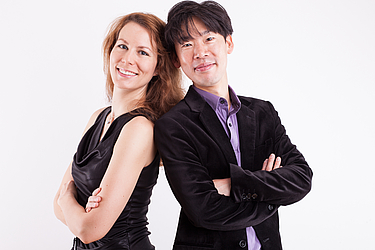
“Our work as a piano duo only developed after our studies. After his postgraduate diploma in piano with Prof. Arne Torger, Tomohito had concentrated on opera conducting under Prof. Hans-Christian Steinhöfel. During this time, I was deepening my knowledge of Lied accompaniment and duo work under Prof. Karl-Peter Kammerlander and David Santos and working towards my final performance examination.
After we had already had our first work experience, independently of one another (as choir director in the theatre, music director on a cruise ship, teacher, and musical consultant for the early evening series The x Files), in 2014, we discovered our passion for playing piano as a duo and it has been the middle point of our musical lives ever since.
Our studies at the HfM in Weimar gave us the knowledge we needed to work as musicians independently so that we have since been able to continually build-on and expand our repertoire with piano duets. Our different experiences during our studies and work life are not a disadvantage, but actually gave us a flexible and variable approach to the challenges of playing as a piano duo.
Apart from this, Professors Arne Torger, Karl-Peter Kannerlander, and Thomas Steinhöfel still support us from time to time with advice and musical ideas even after our studies have ended. These wonderful impulses are important and refresh our playing. That’s why we are very grateful for them.
The establishment of the ‘Notenbank’ by the Heyge-Stiftung in Weimar influenced our work greatly. We were able to rent practice rooms there and being able to play in a comfortable atmosphere really helped us develop.
Overall, studying in this beautiful little town of Weimar prepared us well for our lives as musicians and gave us a foundation for taking our own initiatives in our musical work. Even after the end of our degrees, we still have contact with many professors and fellow students. These are friendships which accompany us on our musical life journey, and which are always leading to new interesting projects”.
Piano duo FourTe (Eva-Maria Weinreich and Tomohito Nakaishi)
The two musicians founded the German-Japanese ensemble in Weimar in 2014. Since then, they have regularly given concerts in Germany, Italy, Austria, and Japan. Among other things, the duo has played in the theatre Zeitz, the art gallery “Alte Weberei” in Ahrenshoop and on TUI cruise ships. The International Summer Academy in Salzburg supported their work with a scholarship in 2015. Both musicians have attended master classes with Joseph Paratore and Prof. Christoph Sischka and have won numerous prizes, including at the TIM competition in Turin 2016 and international competitions in Paris 2016 and Ischia 2015. They have been devoting themselves to composers and musicians of the Second World War since 2019, bringing this forgotten music back to our ears.
“We would do it again”: Aleksandra and Alexander Grychtolik, harpsichord
"When we look back on our time studying in Weimar, then we don’t just think of the excellent conditions at the university (e.g. its historical keyboard instruments and wonderful buildings with their equally historical flair). Above all, we think of the musical impulses we gained from the teacher we had in common: Prof. Bernhard Klapprott. This is what made Weimar such an important part of our harpsichord training which began at the music academy in in Łódź and which continued at the Royal Conservatorium in Brussels.
The aesthetic influences we gained here were framed by the inspiring atmosphere of this ‘pocket-sized’ cultural city. You always had the feeling that you were studying in a special, ‘metaphysical’ place, as it were: we practiced a stone’s throw away from Johann Sebastian Bach’s old Weimar residence, where he also composed many keyboard works and where his eldest sons, Wilhelm Friedemann and Carl Philipp Emanuel Bach, were born – both great keyboardists and composers of wonderful works for harpsichord.
Weimar influenced both our professional and private lives greatly: maybe it is not a coincidence that we got to know each other in Weimar ‘at the harpsichord’ as it were and that the compositions by J. S. Bach and his Weimar-born sons still form such a large part of our concert work all over Europe today. The placement of the university of music in an important historical musical landscape surely played a part in the founding of our ensemble “Mitteldeutscher Hofmusik” (middle German court music) in 2008, in which we follow the tracks of the vocal and instrumental music from middle German Residence culture. In this ensemble, still work closely with the colleagues we met at the university in its idyllic Ilmpark setting.
Looking back on our studies at the University of Music in Weimar we would summarise it like this: we’d do it again.
Aleksandra and Alexander Grychtolik, Weimar
Aleksandra and Alexander Grychtolik met each other during their harpsichord degrees in Weimar. Since then, they have been giving both solo concerts and performing with their ensemble “Mitteldeutsche Hofmusik”, complementing these with radio- and CD-recordings.
For more information see:www.grychtolik.com
“Lots of new sounds”: Klemen Leben, accordion
“Why go to Weimar? A well-informed tourist would have many answers to this question at the ready: Bach, Goethe, Schiller, Liszt, Bauhaus, the Weimar Republic, a beautiful town in stunning surroundings… but would a applicant give the same answer to this opening question?
I was overjoyed to see that the answer I would give today is virtually identical to that which led me to Weimar ten years ago. You could say that today’s answer is just an expanded version of what it was.
Why study in Weimar? For me, the answer is: Prof. Ivan Koval! I knew I had to study in Weimar when I heard him play. Not because of the town, not because the University of Music FRANZ LISZT Weimar has Germany’s oldest accordion department, not because of the university… ten years ago, I only wanted to study here because of the professor! And what awaited me in Weimar exceeded all my expectations and all the wishes burning impatiently inside me. This is because Prof. Koval was, and is, not only an accordion player but above all a musician. And so, I was able to grow as a musician through his advice and ideas.
Fairly quickly, I also noticed that both the university of music Weimar and the city of Weimar have so much more to offer than I knew about before I came. I was able to enjoy excellent theory classes, which – because of generational change – were taught by both senior professors and younger staff and opened-up exciting new fields. Music history lectures with Prof. Dr. Michael Berg were also an experience: a musician and scientist in one person whose lecture notes bordered on the literary!
Working together with the department of new music was especially important for me: lots of new sounds and new friendships. So, as a student I often had the opportunity for experiences outside my faculty (exciting improvisation classes with the professor for jazz guitar Frank Möbus!) or even outside the university. Being so ‘close’ to the Bauhaus University provided uncountable possibilities to play music in different contexts and with the help of different media. Amongst other things, this led me to collaborate on various prize-winning projects, such as audio plays, films etc. as a performer and composer.
Summa summarum … when I look back now, I am happy that I had the opportunity to study in Weimar. I was able to draw strength for new pieces from this heterogeneity of ideas and musical points of view. As a grateful alumnus, I hope that ‘my’ University of Music FRANZ LISZT Weimar remains a cultural centre for openness and diversity.”
Klemen Leben, Ljubljana (Slovenia)
Klemen Leven has been teaching as a professor for accordion at the Conservatorium of Music and Ballet in his home city Ljubljana since September 2011.
“I learned freedom, joy, and confidence”: Alina Bercu, piano
“I came to Weimar when I was 16. Suddenly, everything in my life changed: freedom, for one thing. I was living alone for the first time and had a kind of responsibility I hadn’t known until then. I had to learn to manage my time well, practice a lot, and get to lectures, but also things like grocery shopping and cooking. Weimar was my first ‘teacher’ in that regard, but not just that. I got to know wonderful people here who have remained my best friends.
The most important thing though, my studies, will always remain a highlight for me. At the University of Music FRANZ LISZT I got the best supervision of wonderful professors and I felt that I was cared for. I learned a significant part of the concert repertoire for piano during my studies and without the advice of my Professor Grigory Gruzmann, without his pianist’s ‘secrets’, conversations with him, and his experience, I would not have gained half the musical freedom, joy, and self-confidence that I have today.
What an audience experiences in a concert hall is ‘only’ the tip of the iceberg. A musician has to pay attention to many different facets; it’s about technique, logic, the musical concept and ideas, mastering different styles, and physical fitness – yes, your own health is also important in music. That is why I am more than thankful that my teacher paid attention to all these aspects and that I learned this discipline from him.”
Alina Bercu
Alina Bercu is a guest artist on the most important stages in Europe, America, and Asia. Her debut CD – with chamber music by Schubert and Brahms with Ilian Garnetz on the violin was awarded the “Golden Label” (Benelux) and “Cle d'or” (France). There are three CDs of studio and live recordings by Alina Bercu included in the Romanian radio’s record library “Goldene Phonothek”.
For more information see:www.alinabercu.com
“Intense, inspiring, multifaceted”: Simone Drescher, violoncello
“I had my first encounter with the University of Music “FRANZ LISZT” in Weimar when I was 13 years old in the context of the national competition “Jugend musiziert”. Two years later, my path once again led me to this town on the Ilm for the international master class series with Prof. Michael Sanderling. I already felt a certain connection to this historical and culturally rich town back then. Who’d have thought that my path would lead me to take my entire violoncello degree, right up to my postgraduate diploma, at the “HfM Weimar”...
The creative spirit which reigns here – not just influenced by tradition and cultural heritage, but also through new ideas and impulses on the part of the highly dedicated university administration and many professors – impressed and inspired me here during my studies.
Out of all the enriching experiences I gathered during my studies in Weimar, I learned so much through performance engagements, as well as through the intense, highly inspiring, and multifaceted classes for my major with Prof. Wolfgang Emanuel Schmidt and chamber music rehearsals in the “Fürstenhaus”. These experiences are important memories for me. They range from solo performances under the direction of my colleagues in the conducting class through to chamber music concerts with professors and students both here and overseas, as well as scholarship concerts, and orchestra projects with renown conductors like Christian Thielemann and Marek Janowski.
I was very grateful to the NEUEN LISZT STIFTUNG Weimar (the new Liszt foundation) for the trust they placed in me and their support for my projects and participation in masterclasses overseas. My three years on the student and university council gave me insights into the inner workings of the university and allowed me to advocate for my fellow students and help shape policy decisions at the university.
The performance experience I was able to share during my three volunteer years at the association “Live Music Now”, founded by Yehudi Menuhin took me to various institutions with children, patients, prisoners, and disadvantaged people which greatly helped me develop on both a personal and musical level.
Last, but not least, the holistic approach to culture which the extra curriculars in a ‘studium generale’ - offered under the motto of Franz Liszt’s ideals of general education - continually broadened my horizon. My degree at the university of music in Weimar was a meeting-place of inspiration and evolution which was a great influence on my artistic and personal development as a cellist.”
Simone Drescher
Simone Drescher currently lives in Berlin and is furthering her education with a Master’s degree at the University of Music “Hanns Eisler”. Alongside this, she does both solo and chamber music concerts (including the concerts for young musicians series “Konzerte junger Künstler” 2015/16 by the German Music Council).
For more information see: www.simonedrescher.com
Current videos:
www.youtube.com/watch?v=pPJbNYNwb2A
www.youtube.com/watch?v=8bN7p6UImxE
“An important, impactful experience on each occasion”: Maximilian Junghanns, Violin
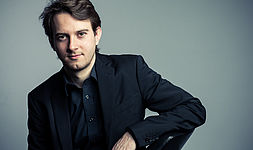
“Weimar! The city of classicism. A place to which all kinds of important people retreated throughout the history of music and art. This unique flair and history cannot be experienced everywhere.
When I came to study at the University of Music FRANZ LISZT Weimar in 2006, I was primarily concerned with my choice of teacher, but I noticed immediately that studying there was something special. For me, ‘time’ was the key word. At first glance, time seems to stand still in this city, but I’ve got to say, it’s exactly this time that you need to mature, both personally and artistically. The way in which my teacher, Professor Friedemann Eichhorn, worked through the pieces with me was spot on.
Alongside technical mastery of the music, a performer should always find their own personal, individual language. During my studies, I never felt that one had to become a soloist if one ultimately wanted to have professional opportunities. Rather, it was more important to develop into a mature, communicative musician. I never sensed an air of unhealthy competition between the students at the university: instead, I felt that my belief that music can only work if it is undertaken collaboratively was confirmed.
The position of importance that the Orchestra of the FRANZ LISZT University held at the university was also very special for me. We generally undertook two projects per semester, which were always followed with great interest by the lecturers and students, and, above all, they gave me a sense of what it meant to be an orchestral musician. What’s more, there were auditions for the leading positions in strings for every project, which provided the perfect preparation for subsequent auditions.
For me, the numerous projects in conjunction with lecturers and the collaboration between students was an important, impactful experience on each occasion, which contributed greatly to my artistic development, particularly in terms of orchestral experience. The courses with Professor Stefan Mai and the projects carried out by the Orchestra of the FRANZ LISZT University were always a core component of my studies.
Now, when I look back over my time in Weimar, I don’t want to forget all those experiences in either the musical sense or the human sense, and I have very fond memories of them.”
Maximilian Junghanns
During his studies at the Weimar University of Music, Maximilian Junghanns studied the violin under Professor Friedemann Eichhorn, under whom he also completed his Master of Music Degree and his Concert Diploma (‘Konzertexamen’) in February 2016. From 2010 to 2012, Maximilian Junghanns was first violin at the Philharmonic Orchestra of Gera-Altenburg. In 2012, he moved to the hr-Sinfonieorchester and since then, he has been a permanent member of this group. He has been second violin at the hr-Sinfonieorchester since 2017.
“Workshop for aspiring artists”: Anna Mehlin, violin
“When I came to Weimar for the first time in 2013, it was difficult for me to imagine starting my studies there of all places. The main reason for coming to Weimar was of course my teacher Prof. Friedemann Eichhorn, but I quickly learned to appreciate and love the town itself. Living and working in hectic Berlin these days makes me enjoy coming back to this quiet spot all the more.
The town, and even more so the university, offered me space and time to develop and grow. This safe space with a family flair was a real advantage from the beginning of my degree because I could concentrate on the most important things without distraction. Despite this, the town and the university still offer enough inspiration and life for you to develop into an artist bit by bit.
The university of music provided fruitful soil for me. First and foremost, I think of the wonderful lessons with Prof. Friedemann Eichhorn who giftedly managed to develop his students according to their individual needs with great patience and enthusiasm. In addition, the university orchestra and the respect it enjoys really impressed me. These projects were implemented semester for semester very seriously and particularly the auditions for first position – the so-called audition training – really helped my auditions in real life.
When I think back to my time in Weimar, I see a picture of a giant laboratory or a workshop for aspiring artists. It offers the possibility to try things out and, in my opinion, is an important milestone on the long way to a fully developed artistic personality”.
Anna Mehlin, Berlin
Violinist Anna Mehlin (under Prof. Dr. Friedemann Eichhorn) won the audition for 2nd violin with the Berlin Philharmonic in November 2016. Anna Mehlin, who was 22 years old at the time, started this new position on the 1st of January 2017.
"A particular source of support": The Klenke Quartett
'The Klenke Quartett was founded at a time of discontinuity and great changes. When we began our studies in Weimar before the re-unification of Germany, we had envisaged the typical, rigidly planned career of orchestra musicians. With the fall of the iron curtain, there were suddenly stunning new possibilities. As a string quartet, we could now participate in international master classes and competitions. We began to consider a joint career as an ensemble, and put this plan into action step by step. The University of Music FRANZ LISZT Weimar supported us in every possible way in these endeavours—without bureaucratic hurdles and, at times, by unconventional means.
The rector at the time, Prof. Wolfram Huschke, provided a particular source of support when making crucial decisions that would help us find our way as a professional string quartet. We are also truly grateful to our revered teachers Prof. Brunhard Böhme, Prof. Karl-Georg Deutsch, Prof. Maria-Luise Lehenseder-Ewald, Prof. Alfred Lipka, and Prof. Frank Strauch, whose exceptional teaching laid the foundation for our development.
Through the endowment of a professorship for chamber music, to which Ulrich Beetz (Abegg Trio) was appointed, we were able to meet a teacher who guided our journey into the world of concert performances with artistic experience and very practical advice. The appointment of Norbert Brainins, leader of the legendary Amadeus Quartet, as visiting professor was another particularly dear gift made to us by the LISZT UNIVERSITY: we were able to strengthen our relationship with our important mentor and esteemed friend. His charisma incited our passion for the Classical masters Mozart, Beethoven, Schubert, and Haydn, and provided the essential building blocks for our successful CD recordings.
We look back to these inspirational years of learning at the University of Music FRANZ LISZT Weimar with tremendous gratitude. We are delighted to be able to pass on some of our knowledge and experience to the next generation.
Klenke Quartett: Annegret Klenke (violin), Beate Hartmann (violin), Yvonne Uhlemann (viola) und Ruth Kaltenhäuser (cello)
Today, the Klenke Quartett can look back on twenty years of joint music-making. Numerous CD recordings give evidence to the diverse artistic projects of the four alumni.
Further information: www.klenke-quartett.de
“My home”: Christian Elsner, bassoon
“My studies in Weimar from 2007 to 2012 influenced me greatly. I had never been so positively challenged! My bassoon professor Frank Forst, in particular, had a talent for seeing exactly what I was missing and for prising the best out of me in order to form me as an artist. It was from him that I learned how important self-discipline is, both for this career and for life, if you want to achieve your goals. Especially during my postgraduate diploma, I really enjoyed my teachers’ flexibility. When I was not living in Weimar any more due to work in Hamburg, I was able to still schedule my classes around my job.
Weimar has an extremely high concentration of students. For this reason, it was not difficult at all to meet nice people. These acquaintances developed into long-term friendships which have remained even after the end of my degree. For a small town, Weimar has a rich cultural landscape – as it to be expected of Goethe and Schiller’s town! – which I greatly enjoyed taking advantage of. The extremely cheap tickets offered to students at the university of music were especially good. In general, student life in Weimar is very comfortable. On the one hand, you get to know a lot of nice people, and on the other hand, you don’t get too distracted from your studies and you also have space to be alone.
The close collaboration of the University of Music FRANZ LISZT and the state orchestra Staatskapelle Weimar offered a good opportunity to gain professional orchestral experience as a substitute player already during my studies. This was particularly applicable to string players – but I got lucky as a woodwind player. Another highpoint of my time in Weimar were the master classes in summer which were offered to students at the university of music for an unbeatably low price. This made it possible for me to take classes with renown musicians, such as Prof. Klaus Thunemann or Prof. Sergio Azzolini or sit-in on all the other interesting courses.
All in all, I am very much looking forward to my next visit in the city which was my home for five years of my life: to meeting good friends, a beer in the student’s bar M18 or a pizza at Antonio.”
Christian Elsner, Hamburg
Christian Elsner has been a solo contrabassoonist with the Hamburg symphony orchestra since 2011. In 2012, he completed his degree in Weimar with a postgraduate Diploma in performance with top marks.
"A true treasure trove for all": Johannes Klumpp, conducting
Weimar forces one to concentrate on the matter at hand, to focus on oneself, yet the view is directed outward (and forward): I never felt that people were comfortably resting on their own laurels here.
The 'Weimar system' means that all students can have lessons not only with their own teachers, but also with all other colleagues, allowing numerous experts to watch over one's progress and putting students on the minds of several different people. As a result, students engage with varying idiomatic styles—a true treasure trove for all students!
When training as a conductor, direct contact-time with an orchestra is the most important. Weimar's education is leading also in this respect. Fruitful co-operations with orchestras in Jena, Sondershausen, Gotha, and Greiz, as well as the trips to Marienbad, Lodz, and Teplice—in addition to the institute's own orchestra—enable students to learn how to work with orchestras not only in theory, but in practice.
A profound technical instruction as the toolkit for the job as conductor, in combination with a development of the mind: all of this happens in carefully-planned manner, yet without being dogmatic. Very simple, yet so complex. Weimar has demonstrated that it can work.'
Johannes Klumpp, Essen
Johannes Klumpp is the principal conductor and artistic director of the Folkwang Kammerorchester Essen. At the Sommermusikakademie Schloss Hundisberg, he conducts the festival orchestra and holds the post of artistic director. Between 2009 and 2011, Johannes Klumpp was assistant conductor ('Erster Kapellmeister') at the Musiktheater im Revier in Gelsenkirchen.
“Teachers with broad horizons”: David Afkham, orchestral conducting
“The University of Music Weimar has a great reputation, especially its conducting department! Conductors at the start of their career rarely have the opportunity to ‘play’ our ‘instrument’ - the orchestra. We need the practical experience plain and simple: concrete work with an orchestra, the chance to experience the sound in our own bodies, the communication, and the psychology of the people, not to mention the musical interpretation of a piece.
The university of music in Weimar offered these practical components from the very start of the degree: I remember how wonderful it was to work with the Jena Philharmonic and the Vogtland Philharmonic in Greiz Reichenbach, as well as job shadowing with the university of music’s orchestra and courses in ‘Marienbad’ and ‘Teplice’. This time in front of the orchestra was invaluable: we could test our limits, make mistakes, learn was it means to lead and to be led – the start of highly complex lifelong learning processes!
Personally, I was very grateful to have the feeling of being in good hands during this process: I have much to thank my teachers for. Each individual subject fitted into the big picture of conducting as a profession. Even though Weimar is a smaller town, compared to Berlin for instance, it is connected to a rich and inspiring history and you can concentrate on yourself and on your studies really well.
And if you then also have teachers at your side with broad horizons and who understand what it means to have to ‘just quickly’ go and listen to a rehearsal in Berlin and who support you beyond ‘normal’ university life, then this is just the perfect combination!
David Afkham
David Afkham has been lead-conductor and artistic director of the Orquesta Nacional de España in Madrid since 2019. In addition, he is also an internationally sought-after opera and concert conductor.
"Squaring the circle, unique in the world": Ansgar Beste, composition
"I owe the Franz Liszt Music University in Weimar a solid top-level education (2002-07) as an artistic-administrative generalist. It enabled me to square a circle that is probably unique in the world, namely to complete five degree programmes (Opera répétiteur studies, Composition, Music Theory, Piano, Arts Management) in five years and to graduate between 2007 and 2010, as well as to take part in extracurricular conducting projects of the "Dirigentenschmiede" and to participate in the orchestra "Collegium Musicum" (1 year), in the university chamber choir (2 years), in five different university committees and in an appointment committee (conducting).
Among countless lasting memories of my full-throttle studies in Weimar, I particularly like to think back to the infallible conducting skills of Prof. Gunter Kahlert and Prof. Jürgen Puschbeck, the excessive virtuoso high-pressure sight-reading training on two pianos with Prof. Ulrich Vogel, the functional-clinical singing lessons with Martin Ulrich, the highly sensitive detailed work with Prof. Gerhard Erber (piano), Prof. Karl-Peter Kammerlander (song interpretation) and Gerd Amelung (harpsichord), the creative and unconventional approaches of Prof. Christoph Ritter (song interpretation) and Prof. Dr Albrecht von Massow (musicology) as well as various opera projects, opera internships and international conducting masterclasses.
However, my composition studies with Prof Michael Obst were the most formative: as a gifted teacher, he introduced me to the secrets and fascinating power of new music and encouraged me from the outset to pursue an independent compositional path: "You are the composer!" The composers' colloquium remains unforgettable, where, together with my critical fellow students, the works of established contemporaries were scrutinised and admired and torn apart in equal measure.
I came to Weimar as a seeker and after five intensive years found my vocation as a composer, which I have been pursuing (very independently) ever since. I gratefully carry my Weimar tools - my practical experience as an instrumentalist, vocalist, conductor, music theatre person and cultural manager - in my luggage as a source of inspiration!"
Ansgar Beste
Ansgar Beste is a freelance composer. Further information: www.ansgarbeste.com
“Vocal and personal appreciation”: Frederik Beyer, singing / musical theatre
“Small town with world-wide fame, open air museum, cultural hotspot– Weimar is a paradise. For studying too. I always found it inspiring to live in a town in which great poets, thinkers and musicians rubbed shoulders. You can stumble from Lucas Cranach to Johann Sebastian Bach, from Schiller and Goethe to Herder und Wieland, from Hummel to Wagner – and somehow it is as though this place is still breathing the spirit of these great men.
Weimar is large enough for you to develop as an artist and small enough to let you concentrate on the important things. This was one of the main arguments for studying in this little town. In the ‘90s, the voice department had risen in reputation through the work of Prof. Eugen Rabine and his functional methods. I found this modern vocal training and appreciation for the voice and for people to be incredibly beneficial. There are still many vocal coaches using the functional method at the university of music today.
The song courses with Prof. Karl-Peter Kammerlander were especially helpful for my artistic development. I like to look back on this intense work together with with songs and almost forgotten melodramas. Evan Bortnick gave me valuable impulses for my development as a vocal coach. Evan Bortnick is curious about almost everything which has to do with the voice. He passed this spark on to me. Today, I train people who rely heavily on their voice in their profession.
Frederik Beyer, Erfurt
Frederik Beyer was a multi-award winner at the International Melodrama Competition in Prague. He works as a successful speaker on the radio and television, including stations such as the “Mitteldeutschen Rundfunk” and “ZDF”. In addition, he is a sought-after vocal and speaking coach across Germany. For instance, he has had coaching contracts with the University of Erfurt and the media academy “Hochschule der Medien” Stuttgart; trains budding international singers in diction at the Lyric Opera Studio Weimar; and regularly teaches at the school of speech “Schule des Sprechens” in Vienne.
For more information see: www.frederikbeyer.de
"Something great, especially for a singer": Ulrich Burdack, singing / music theatre
"The six years I spent studying singing in Weimar are a special experience for me. This time as a young adult in this very special area of German (cultural) history, picturesquely embedded in Thuringia's hilly landscape, had a huge impact on me both artistically and personally. The vocal department at Belvedere Palace always had a very special atmosphere - especially in the summer semester. Especially for a singer, who inevitably also deals with German literature when singing lieder, life in a city where all the greats of culture were actually on hand must be something great. Also, or precisely because it is not a pulsating metropolis. Where else do you have the opportunity to go for a three-step walk in one of the city's beautiful parks between two lessons?
I am still in close contact with my singing professor Mr Lanskoi and talk about every step I take in my professional life. It was exciting for me to experience that after my first year at the Tiroler Landestheater Innsbruck, he no longer saw me just as a student, but also as a colleague. I remember wonderful hours with Ursula Lenk or Professor Kammerlander in the Lied programme as well as intensive rehearsals with Professor Fulda in the studio theatre for the university's opera productions.
When I left the Fürstenhaus after my recital for the concert exam in summer 2011 and realised that I had really done everything there was to do as a student at the university, I knew that I would always love to come back to Weimar. And now that I'm strengthening the ensemble in Halle / Saale after my stops in Innsbruck and Kiel and am therefore back in the neighbourhood, I certainly will!
Ulrich Burdack, Halle / Saale
Ulrich Burdack has been singing with the TheaterPhilharmonie Thüringer in Gera and Altenburg since the 2016/2017 season. In 2018, he was awarded the Theatre Oscar by the theatre associations of the cities of Gera and Altenburg. Further information: www.ulrichburdack.de
"Decisive influence": Indra Tedjasukmana, jazz vocals
“My years studying at the University of Music FRANZ LISZT Weimar from 2005 to 2013 formed and decisively influenced my musical identity. Prof. Michael Schiefel and Prof. Jeff Cascaro gave me very individualised lessons in my jazz vocals major, for which I was very thankful. To this day, Prof. Wieland Reißmann (composition and arrangement) remains my mentor in questions of music philosophy and arrangement. I have him to thank for being able to establish a secondary means of support as a composer and arranger.
Prof. Leonid Chizhik influenced me on the keys like no other. I will always remember those special hours in his class. Room 203 in the “Fürstenhaus” was the creative home of a unique group of artists who are now highly successfully taking their own paths all across the world.
Audio engineers “par excellence” Matthias Middelkamp and Joachim Müller were always there for me with an open ear. I learned more about the realities of music in the recording studio than anywhere else. Postgraduate studies in piano improvisation with Hinrich Steinhöfel rounded-off my time in Weimar.”
Indra Tedjasukmana
Indra Tedjasukmana is now one of the world’s most sought-after beatboxers and has become a brand unto himself with his world-wide gigs in Singapore, Montréal, and Helsinki, amongst others. He has been awarded international prizes, such as the World Vocal Award in Taipei, Taiwan.
"There could hardly be a better place to do a doctorate on Romantic songs and poetry." Dr Maria Behrendt, Musicology
There is hardly a more beautiful place to do a doctorate on the songs and poetry of the Romantic period than the Department of Musicology Weimar-Jena. Located in the "Weimar Acropolis", with a view of the English landscape garden of the Ilm Park (where the romanticisation of nature and the Middle Ages can be sensually experienced on a walk!), and only 15 minutes away from the early Romantic city of Jena. I spent nine intensive years at the Weimar Department from 2012 to 2021, first as a doctoral student and research assistant, then as a postdoctoral fellow and lecturer, before a postdoctoral position took me to the Philipps University of Marburg in 2021 (fairytale city, so also quite romantic!).
What I loved most about Weimar was the short distances - not only geographically between my flat, the institute, crêperie and university daycare centre, but also within the university: I organised several artistic and academic projects, which was only possible thanks to the wonderful coexistence of academia and artistic practice under one roof. I particularly remember my involvement in the Weimar Song Festival, together with Prof Kammerlander. On several occasions, I was able to give lectures and organise discussion concerts, and thus actually bring the romantic song repertoire that I had rediscovered to performance.
I also found the variety of research specialisations at the department very inspiring. The range of differently orientated professorships and research projects that the Weimar Department hosts is truly unparalleled, and I found it great to witness the progress of the various projects at the weekly colloquium sessions. But I also got to know wonderful people outside of my artistically and academically orientated colleagues, for example in the administration and library, who were always happy to help and advise me.
I enjoyed walking up the steep path first to the Horn and later to the Altenburg every morning, enjoying the magnificent view, the nice colleagues and the inquisitive students. Fortunately, I don't have to do without much of that in Marburg either: Instead of strolling along the Ilm, I now stroll along the Lahn in the morning, look out over the Landgrave's Palace and the Spiegelslust Tower and am looking forward to bringing the experience I gained in Weimar to the Marburg institute.
“Practical keyboard skills for the classroom is given high priority”: Tobias Usbeck, music teaching
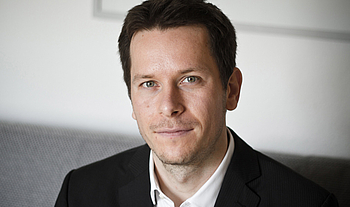
“I studied music teaching at the University of music FRANZ LISZT Weimar from 2002 to 2007, majoring in classical piano with complementary studies in classical voice and jazz/pop/rock vocals.
I attended seminars run by Prof. Gero Schmidt-Oberländer during my degree, while classes in “Schupra” (practical keyboard skills for the classroom) were primarily with Stefan Bauer and two semesters with Wolfgang Drengk. The subject “Schupra” has a higher priority in Weimar than at almost any other university of music. This is reflected in the number of professors and tenured positions for classroom keyboard skills as well as in the many semesters of one-on-one teaching students are entitled to – which is not a matter of course at German music academies and universities.
“Schupra” is one of the most important subjects for students of music teaching because it offers a very comprehensive subject which primarily includes the areas of accompaniment, sight-reading, and improvisation. Skills from the areas of piano, singing, music theory, and music teaching are brought together and applied in practice. The subject is intended to prepare students for the careers later and, at the same time, it extends the students’ possibilities for artistic expression. “Schupra” facilitates the latter very well e.g. through improvisation but also through the wide-range of skills – from figured bass and (international) folk, through to jazz and contemporary pop music.
In my opinion, a good music teacher should be able to move in these different areas, both in piano and singing as well as in group-leadership. The artistic quality of the subject was once again demonstrated at the national “Schupra” competition in Weimar recently. Looking back, I can say that my education in Weimar (and at various tertiary institutions) and my experience as a music teacher did a very good job of preparing me for teaching this subject. In this context, I am very grateful that the HfM Weimar has been providing many lectureships in this field for some years now, which offers students (current and previous) the possibility to gather their first teaching experience in this subject”.
Prof. Tobias Usbeck, Würzburg
Tobias Usbeck tutored “Schupra” already during his degree. During his practical teaching certification at the grammar school Humboldt-Gymnasium in Weimar and then later when he was working as a teacher, he also did lectureships in “Schupra” in Weimar, Leipzig, and Erfurt. Tobias Usbeck was appointed Professor for practical classroom keyboard skills at the University of Music Würzburg in the summer semester of 2016.
“Strong practical approach”: Kathrin Kondaurow, musicology / cultural management
“Weimar – a magical place. Alleyways out of a painting, stately buildings and squares which invite you to wonder in the footsteps of Goethe, Schiller, Bach, Liszt, and many others. But Weimar’s cultural life is not stuck in the past. It stands with both feet firmly planted in the present: alongside large institutions like the Klassik Stiftung Weimar and the German National Theatre DNT, it is first and foremost the University of Music FRANZ LISZT and the Bauhaus University Weimar which are influencing, forming, and promoting the new – young! – local high culture.
My love affair with Weimar began in the year 2005 when I started my degree in the subjects of musicology, cultural management, and French literature in Weimar and Jena. The appeal of studying musicology and cultural management in Weimar lay primarily in the strong practical approach which studying at a university of music offers. This promise was quickly fulfilled: I was included in practical projects right from the start of my degree: I worked at the university’s own arts agency weim|art for many years, curated my own concert series in cooperation with the TU Ilmenau, and assisted at the international LOUIS SPOHR competition for young violinists.
The broad range of seminars offered made it possible to get a good sense of direction for a career in musicology and cultural management later. Alongside the highly qualified professors and teaching staff at the university of music – I hold opera seminars with Prof. Dr. Helen Geyer and the field trips for cultural studies with Prof. Dr. Steffen Höhne in loving and valued memory – there was a broad range of classes with guest lecturers with both academic and practical backgrounds. I found enough fodder for my love of opera and theatre: theatre studies seminars with Dr. Arne Langer, the head dramaturge at the Erfurt theatre; theatre management courses with the then director of DNT Weimar Thomas Schmidt; insights into the culture-politics with the director of the German cultural council Olaf Zimmermann, and much more.
The strong practical approach taken at the HfM FRANZ LISZT Weimar prepares its students for professional life in a number of ways and makes starting out in a career easier. I am still strongly connected to the university of music and I still look forward to being in artistic communication with the university through my profession as music theatre dramaturge at DNT.
Kathrin Kondaurow, Weimar
Kathrin Kondaurow has been music theatre dramaturge at the German national theatre DNT since the 2011/12 season. The play development of Luigi Nono’s “Die erleuchtete Fabrik” which she designed together with director Julia Huebner was awarded the Götz-Friedrich prize. In the 2019/20, she took on the role of artist director at the Staatsoperette in Dresden.
“Formative encounters”: Lena Voss, musicology
“I believe that there must be hardly any other person who is less typically musicologist than I. Even so, my musicology degree in Weimar changed my life. Not directly through the studies, but more the encounters I had with unique and completely different personalities during my studies in Weimar.
On the one hand there were the professors and teaching staff: where a good audition was enough for many, for me, there were other issues caused by my non-standard educational background. Without even knowing me, Dr. Christoph Meixner personally made it possible for me to never-the-less study in Weimar back then. Prof. Albrecht von Massow supported me personally during my studies and emphasised that I had talent as a teacher even before I realised that this would be my profession. Press officer at the HfM Jan Kreyßig was also a kind of ‘teacher’ for me during the almost three years I held a student position in the press and print media office and I learned a lot from him both professionally and personally.
On the other hand there were the encounters in day-to-day life in Weimar: my time with the Collegium Musicum Weimar was particularly influential, because this is where people from all sorts of different areas come together. The orchestra does not just bring together students from the different subjects at the HfM Weimar (musicology, cultural management, music teaching, church music, conducting, jazz, etc.) but also from the Bauhaus Uni Weimar (Architecture etc.), the Friedrich Schiller University Jena (medicine etc.), as well as individuals whose student days are long over. In the Collegium Musicum, it didn’t matter at all what area you came from, what language you spoke, or how old you were, and it still doesn’t. We were simply connected by our desire to play music and our love of classical orchestral music. In this circle friendships were made which formed myself and still guide me until today.
All these encounters during my studies have proven to be worth more than their weight in gold for my current job as concert pedagogue with a classical orchestra. They are irreplaceable! This is because you have to pick people up where they are when you are introducing them to the music of a symphony orchestra. It doesn’t matter what area they come from, what language they speak, or how old they are. It cannot be your aim to ‘convert’ someone to classical music. Instead, it is primarily to open the door to this often rather strange world and to find a way to approach it. The power which lies in the music will reach those people who are open to it.”
Lena Voss
Lena Voss has been working as an editor with Production Partner since 2017.
"Friendly and familiar atmosphere": Uwe Wagner, Arts Management
"I associate a lot of positive things with my time in Weimar. Weimar is familiar, extraordinary and endearing. A world cultural heritage site - popular and frequently visited by tourists and school trips, yet not dominated. It is a young, colourful and above all musical city. There are simply so many interesting people in this place - musicians, architects, scientists, film-makers, students and professors. And, of course, the people of Weimar themselves, who seem to get on very well with this mix. All this results in an incomparable, friendly and familiar atmosphere.
What's more, the city is very liveable, especially for students. I enjoyed attending the many (free) concerts by jazz students at the highest level, taking advantage of the sports programme at Bauhaus University or being able to participate in the chamber choir at the Music university - a great experience that has shaped me to this day. I would like to take this opportunity to thank Professor Puschbeck once again for taking the risk of including a cultural manager and cellist in the choir ... Other important aspects for me were the beautiful old town, the great park (ideal for jogging or walking) and, of course, the opportunities offered by Weimar's surrounding area: You can be in Erfurt or Jena in 20 to 30 minutes by train, combined with "metropolitan" offers, a larger pub scene and basically a bit more hustle and bustle.
Thanks to Professor Höhne and his great team around Ralph-Philipp Ziegler, who is now in charge of cultural affairs in Offenbach, the Arts Management programme was also an enrichment for me personally. Thanks to the university's links to Finland, I was able to broaden my horizons in the pop business in Jyväskylä (central Finland) as part of the International Music Management programme there. A great thing. Weimar is certainly not suitable for everyone. But if you like the quiet, personal atmosphere of this lovely city and know how to make the most of the many opportunities, you'll have a great time."
Uwe Wagner
Uwe Wagner, born in 1982, has been Managing Director of Neunkircher Kulturgesellschaft gGmbH since the beginning of 2014. Together with his team, he is responsible for the municipal gallery, the adult education centre, the music and musical school and over 140 events with around 70,000 visitors a year. Wagner's previous roles included administrative director of the Rheingau Music Festival.
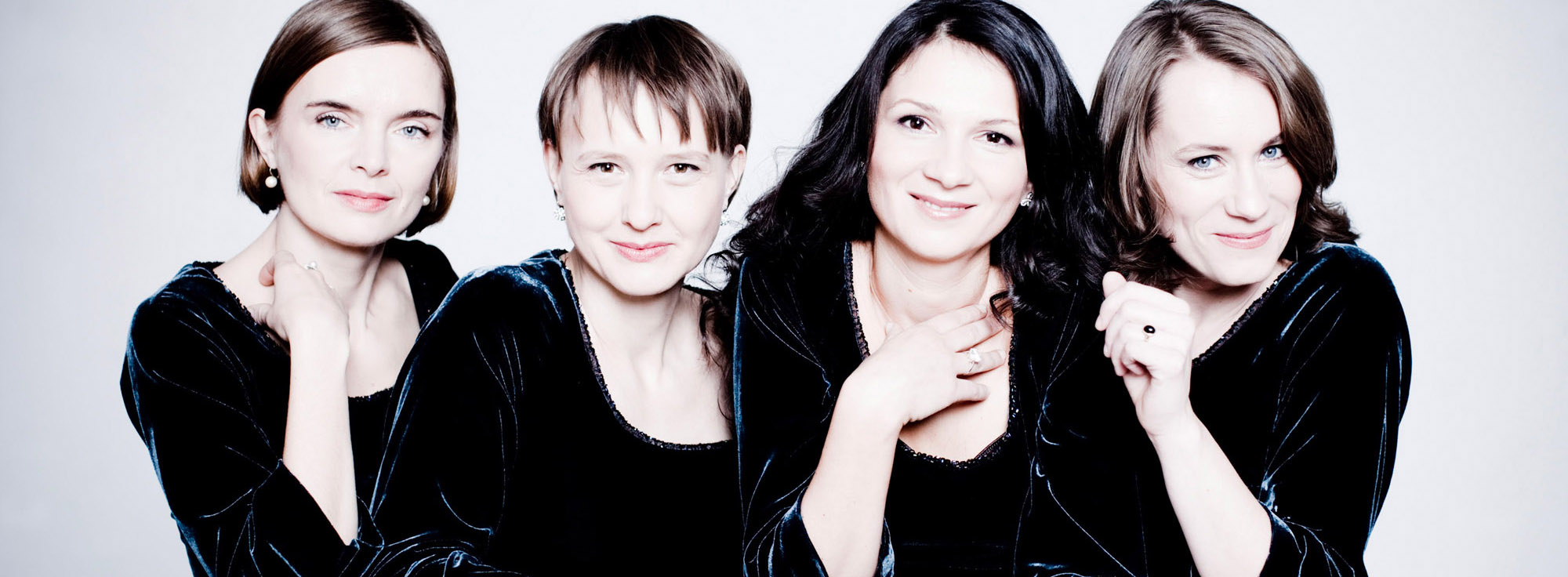
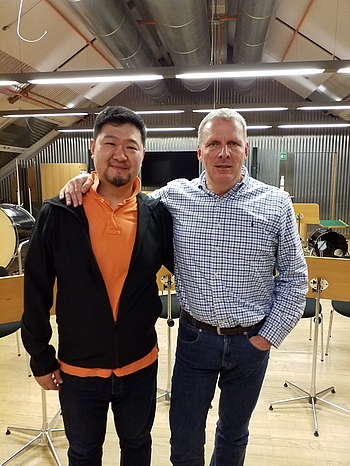
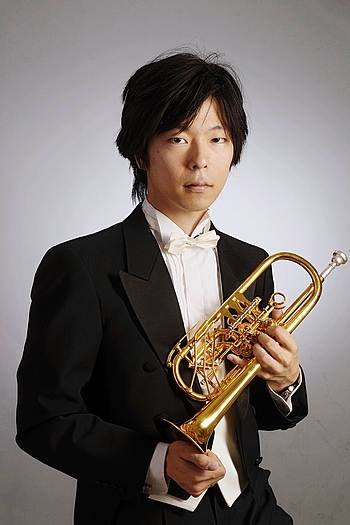
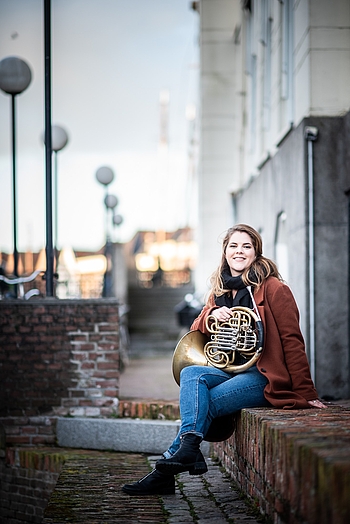
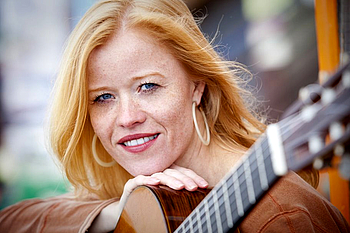
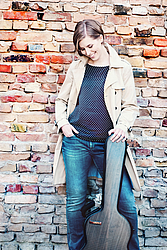

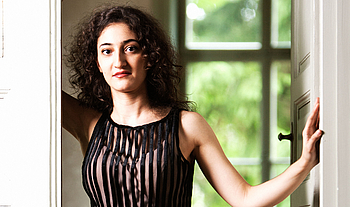
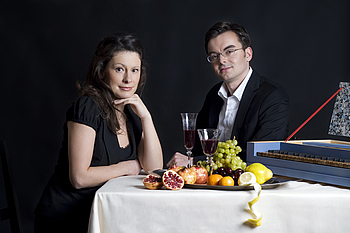
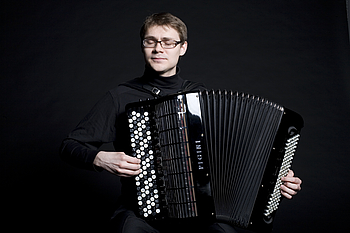
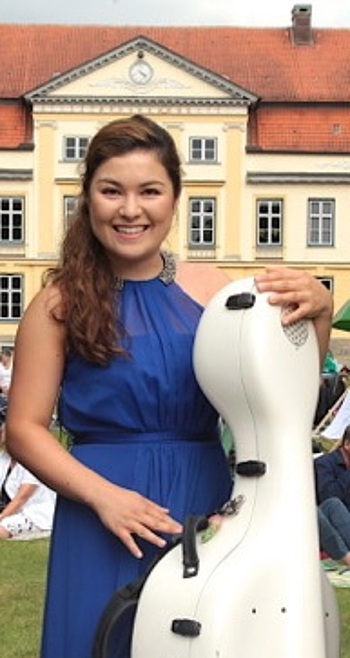
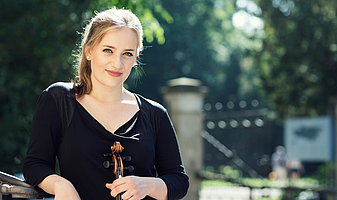
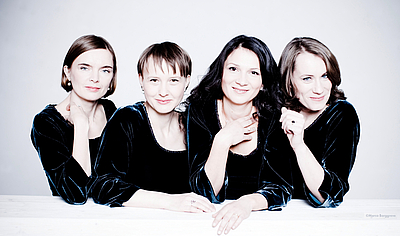
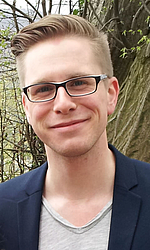
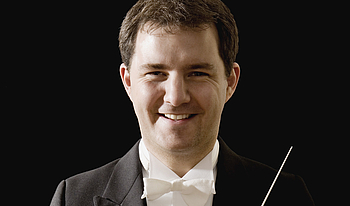
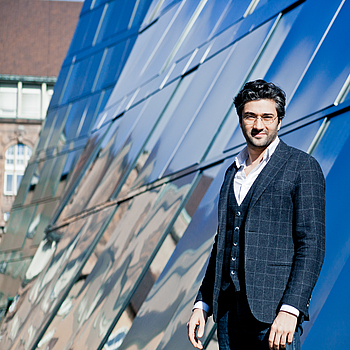
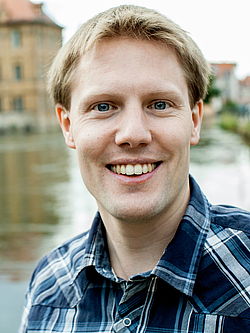
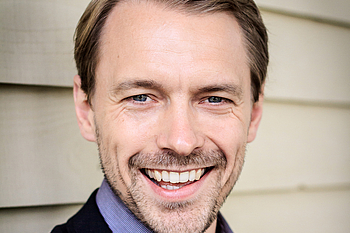
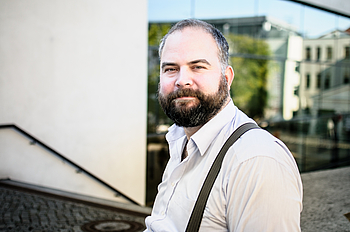
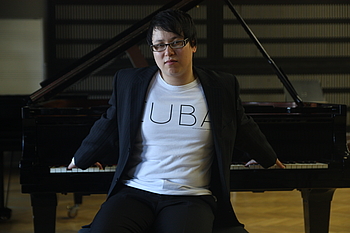
![[Translate to English:] Das Bild zeigt ein Potrait von Dr. Maria Behrendt](/securedl/sdl-eyJ0eXAiOiJKV1QiLCJhbGciOiJIUzI1NiJ9.eyJpYXQiOjE3NzIyODQ3NjQsImV4cCI6MTc3MjM3NDc2NCwidXNlciI6MCwiZ3JvdXBzIjpbMCwtMV0sImZpbGUiOiJmaWxlYWRtaW4vX3Byb2Nlc3NlZF8vNy8xL2NzbV9NYXJpYV9CZWhyZW5kdF9fY19wcml2YXRfMTMxOGQwOTc3ZC5qcGciLCJwYWdlIjoxODB9.8cqqikMPeQDeh2RviL2lZBo9GOiAWc9chgLiMiURai8/csm_Maria_Behrendt__c_privat_1318d0977d.jpg)
